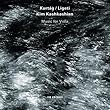 By Daniel Garrett
By Daniel Garrett
Kim Kashkashian, Kurtag & Ligeti – Music for Viola
ECM, 2012
The viola music of Kim Kashkashian has won attention and commendation; and her Kurtag & Ligeti – Music for Viola exploration of the composers Gyorgy Kurtag and Gyorgy Ligeti is serious without being dull or plodding—it is beautiful, intricate, somber, and moves more quickly than one anticipates. An international performer, Kim Kashkashian is American, born in Michigan to an Armenian mother and father; and she has worked with Zubin Mehta and Riccardo Muti and many other distinguished conductors and musicians. Kim Kashkashian, once a student at the Peabody Institute and the Marlboro Music Festival, has performed as the featured player with orchestras, or as a recitalist, in Berlin, Boston, London, Milan, New York, San Francisco, Tokyo, and Vienna. Her repertoire has embraced Bartok, Berio, Brahms, and Hindemith, among others. (The Boston resident Kashkashian is also a teacher at the New England Conservatory of Music.) Hearing Kim Kashkashian interpret Kurtag and Ligeti is special. It seems to be another language—intricate, mysterious, a different kind of experience and expression. Abstract. Modern. Varied in rhythm and tone. Requiring attention, focus—it could be a form of meditation. Kim Kashkashian’s Music for Viola is special and has been received as such (for one thing, it has won a Grammy award).
On Kurtag & Ligeti – Music for Viola, the solitary, solemn viola evokes a sense of isolation, possibly in a natural landscape (“In Nomine,” followed by “Silent Lines”). “Letter to Vera Ligeti” is light and slight; expressive is “For Imre Foldes at 60” and the fourth piece, “Chromatically saucy,” is short and dynamic, feeding easily into the next piece. Most of these pieces are short. “A Flower” hardly seems more than a quiet, sustained note with very small variations; and “In Memoriam Blum Tamas” is somber,” and “In Memoriam Aczel Gyorgy” a brief, elegiac salute. “J.H. song” is angular, “Beating” is piercing, and “The Carenza Jig” is plucky,” followed by “Kroo Gyorgy in memoriam.” “Homage to John Cage” is no more than short bursts of sound. Pieces fourteen through nineteen move quickly, being short (“For the Garzulys,” “Perpetuum Mobile,” “Signs I,” “Signs II,” “Four Entwined Bodies,” and “Plaintive Tune”).
In the album notes by Wolfgang Sandner, Sander discusses the East European music tradition that Kim Kashkashian is addressing, with its defiance of the cult of beauty, its use of compression and counterpoint, its experimental rigor, its appeal to perception and cognition. The writer Wolfgang Sandner, before commending Kashkashian for her understanding of structure and subtle expression, states, “Musical character—and that is what we are dealing with here—does not express itself on or between the five lines of the staff; at best it hovers in the background of the score, only to come to the fore when the score is made sound.”
The Ligeti Sonata is the last segmented composition in the Kashkashian recording Kurtag & Ligeti – Music for Viola: the “Hora Lunga” has long sad notes, the “Loop” a lot of energy and movement, and “Facsar” is melancholy but with a swinging rhythm. Very quick and smooth is “Prestissimo con sordino” for Klaus Klein, but “Lamento’ has a firm, intense sound. Edgy, fast, and dramatic is “Chaconne Chromatique.”
Daniel Garrett, a graduate of the New School for Social Research, and the principal organizer of the Cultural Politics Discussion Group at Poets House, is a writer whose work has appeared in The African, All About Jazz, American Book Review, Art & Antiques, The Audubon Activist, Black Film Review, Changing Men, Cinetext, Contact II, Film International, The Humanist, Hyphen, Illuminations, Muse Apprentice Guild, Option, Pop Matters, Quarterly Black Review of Books, Rain Taxi, Red River Review, Review of Contemporary Fiction, Wax Poetics, and World Literature Today. Daniel Garrett has written extensively about international film for Offscreen, and comprehensive commentary on music for The Compulsive Reader.